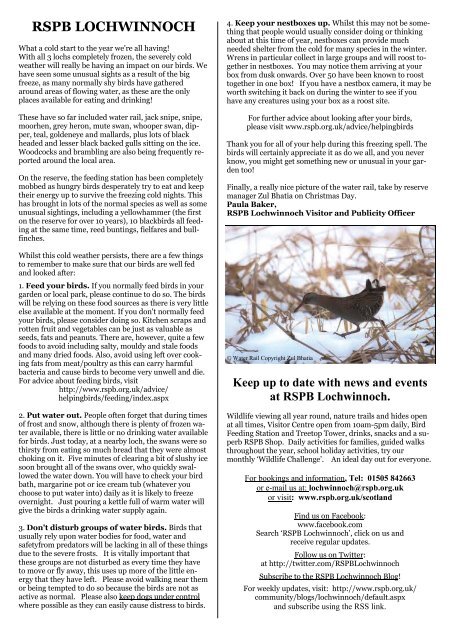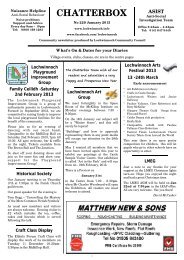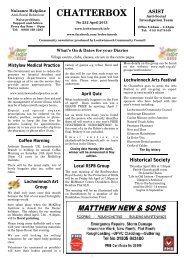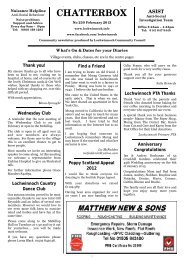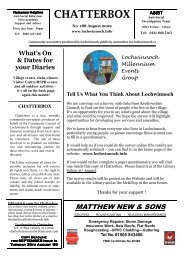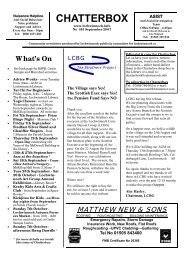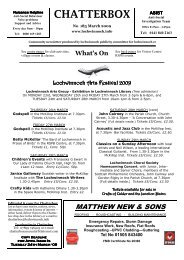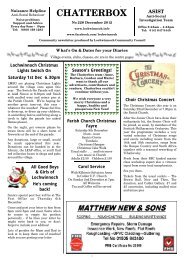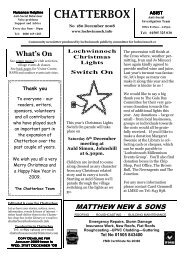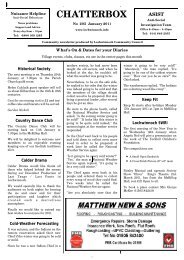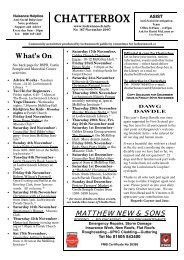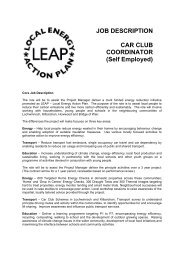CHATTERBOX - Lochwinnoch
CHATTERBOX - Lochwinnoch
CHATTERBOX - Lochwinnoch
You also want an ePaper? Increase the reach of your titles
YUMPU automatically turns print PDFs into web optimized ePapers that Google loves.
RSPB LOCHWINNOCH<br />
What a cold start to the year we're all having!<br />
With all 3 lochs completely frozen, the severely cold<br />
weather will really be having an impact on our birds. We<br />
have seen some unusual sights as a result of the big<br />
freeze, as many normally shy birds have gathered<br />
around areas of flowing water, as these are the only<br />
places available for eating and drinking!<br />
These have so far included water rail, jack snipe, snipe,<br />
moorhen, grey heron, mute swan, whooper swan, dipper,<br />
teal, goldeneye and mallards, plus lots of black<br />
headed and lesser black backed gulls sitting on the ice.<br />
Woodcocks and brambling are also being frequently reported<br />
around the local area.<br />
On the reserve, the feeding station has been completely<br />
mobbed as hungry birds desperately try to eat and keep<br />
their energy up to survive the freezing cold nights. This<br />
has brought in lots of the normal species as well as some<br />
unusual sightings, including a yellowhammer (the first<br />
on the reserve for over 10 years), 10 blackbirds all feeding<br />
at the same time, reed buntings, fielfares and bullfinches.<br />
Whilst this cold weather persists, there are a few things<br />
to remember to make sure that our birds are well fed<br />
and looked after:<br />
1. Feed your birds. If you normally feed birds in your<br />
garden or local park, please continue to do so. The birds<br />
will be relying on these food sources as there is very little<br />
else available at the moment. If you don't normally feed<br />
your birds, please consider doing so. Kitchen scraps and<br />
rotten fruit and vegetables can be just as valuable as<br />
seeds, fats and peanuts. There are, however, quite a few<br />
foods to avoid including salty, mouldy and stale foods<br />
and many dried foods. Also, avoid using left over cooking<br />
fats from meat/poultry as this can carry harmful<br />
bacteria and cause birds to become very unwell and die.<br />
For advice about feeding birds, visit<br />
http://www.rspb.org.uk/advice/<br />
helpingbirds/feeding/index.aspx<br />
2. Put water out. People often forget that during times<br />
of frost and snow, although there is plenty of frozen water<br />
available, there is little or no drinking water available<br />
for birds. Just today, at a nearby loch, the swans were so<br />
thirsty from eating so much bread that they were almost<br />
choking on it. Five minutes of clearing a bit of slushy ice<br />
soon brought all of the swans over, who quickly swallowed<br />
the water down. You will have to check your bird<br />
bath, margarine pot or ice cream tub (whatever you<br />
choose to put water into) daily as it is likely to freeze<br />
overnight. Just pouring a kettle full of warm water will<br />
give the birds a drinking water supply again.<br />
3. Don't disturb groups of water birds. Birds that<br />
usually rely upon water bodies for food, water and<br />
safetyfrom predators will be lacking in all of these things<br />
due to the severe frosts. It is vitally important that<br />
these groups are not disturbed as every time they have<br />
to move or fly away, this uses up more of the little energy<br />
that they have left. Please avoid walking near them<br />
or being tempted to do so because the birds are not as<br />
active as normal. Please also keep dogs under control<br />
where possible as they can easily cause distress to birds.<br />
4. Keep your nestboxes up. Whilst this may not be something<br />
that people would usually consider doing or thinking<br />
about at this time of year, nestboxes can provide much<br />
needed shelter from the cold for many species in the winter.<br />
Wrens in particular collect in large groups and will roost together<br />
in nestboxes. You may notice them arriving at your<br />
box from dusk onwards. Over 50 have been known to roost<br />
together in one box! If you have a nestbox camera, it may be<br />
worth switching it back on during the winter to see if you<br />
have any creatures using your box as a roost site.<br />
For further advice about looking after your birds,<br />
please visit www.rspb.org.uk/advice/helpingbirds<br />
Thank you for all of your help during this freezing spell. The<br />
birds will certainly appreciate it as do we all, and you never<br />
know, you might get something new or unusual in your garden<br />
too!<br />
Finally, a really nice picture of the water rail, take by reserve<br />
manager Zul Bhatia on Christmas Day.<br />
Paula Baker,<br />
RSPB <strong>Lochwinnoch</strong> Visitor and Publicity Officer<br />
© Water Rail Copyright Zul Bhatia<br />
Keep up to date with news and events<br />
at RSPB <strong>Lochwinnoch</strong>.<br />
Wildlife viewing all year round, nature trails and hides open<br />
at all times, Visitor Centre open from 10am-5pm daily, Bird<br />
Feeding Station and Treetop Tower, drinks, snacks and a superb<br />
RSPB Shop. Daily activities for families, guided walks<br />
throughout the year, school holiday activities, try our<br />
monthly ‘Wildlife Challenge’. An ideal day out for everyone.<br />
For bookings and information, Tel: 01505 842663<br />
or e-mail us at: lochwinnoch@rspb.org.uk<br />
or visit: www.rspb.org.uk/scotland<br />
Find us on Facebook:<br />
www.facebook.com<br />
Search ‘RSPB <strong>Lochwinnoch</strong>’, click on us and<br />
receive regular updates.<br />
Follow us on Twitter:<br />
at http://twitter.com/RSPB<strong>Lochwinnoch</strong><br />
Subscribe to the RSPB <strong>Lochwinnoch</strong> Blog!<br />
For weekly updates, visit: http://www.rspb.org.uk/<br />
community/blogs/lochwinnoch/default.aspx<br />
and subscribe using the RSS link.


